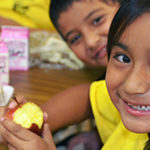DALLAS—At least 1,000 high school students enrolled in Dallas schools experience food insecurity due to homelessness, but congregations and other community organizations can help meet some of their needs, a veteran school district administrator told representatives of the Dallas-area faith community.
Mark Pierce, homeless liaison for 21 years with the Dallas Independent School District, spoke to a group at Cliff Temple Baptist Church in Dallas convened by the Dallas Coalition for Hunger Solutions.
 Jana Jackson, director of family and community ministries at Dallas Baptist Association, co-chairs the coalition’s faith community action team, which seeks to engage churches and other faith groups in effective hunger-fighting activities.
Jana Jackson, director of family and community ministries at Dallas Baptist Association, co-chairs the coalition’s faith community action team, which seeks to engage churches and other faith groups in effective hunger-fighting activities.
Children and youth are considered homeless when they lack a fixed, regular and adequate nighttime residence, Pierce explained. They include families who live week-to-week in budget motels or at campgrounds because a parent cannot find an apartment to rent due to a prison record and those who live in substandard housing without utilities.
They also include “sofa surfing” and “couch hopping” teenagers who find temporary lodging provided by friends after they leave home, often due to abusive situations, he said.
Schools in the Dallas Independent School District enroll 130 homeless students a week on average, and more than 4,200 students in the district experienced homelessness, Pierce said.
Drop-in centers offer food, supplies, referrals
To help meet the needs of homeless students, the Dallas school district has established drop-in centers at a dozen high schools where students receive backpacks, school supplies, hygiene items and nonperishable food. They also offer referrals to health and dental care, substance abuse counseling and other appropriate services.
Churches can help by providing a hot meal periodically—once a week or once a month—to students who visit the school’s drop-in center. Some churches may follow the lead of the Church of the Incarnation, which established its Incarnation House after-school program.
Sign up for our weekly edition and get all our headlines in your inbox on Thursdays
Support for the drop-in centers was among the hunger-fighting solutions the faith community action team identified for congregations to consider. While some are specific to North Texas, many can be replicated throughout the state.
Strategies include:
- The Souper Bowl of Caring is an annual campaign to stock the shelves of hunger-relief organizations such as a food pantry or soup kitchen. Churches collect canned goods and other nonperishable food items between Jan. 1 and Super Bowl Sunday. Each congregation can select the organization or organizations it wants to benefit.
- Out-of-school child meals include federally funded summer meals programs and after-school programs. Churches can serve as meal sites or can provide volunteers to staff a site in their community. Volunteers also can provide enrichment activities—recreational or educational—for students before or after meals.
- Eating Well is a SNAP is an educational program for low-income senior adults, to help them learn how to eat well on a limited budget and make the best use of benefits available through the Supplemental Nutrition Assistance Program. Churches can present the program to senior-adult groups and enlist volunteers to make presentations in the community. For more information, contact Wyonella Henderson-Greene at the Texas Hunger Initiative, (214) 951-7780 or [email protected].
- Community Distribution Partners use a “hub-and-spokes” distribution model to increase the efficiency of food distribution in areas of greatest need. The Dallas area has two working hub models in place—Crossroads Community Services, an urban outreach ministry launched by First United Methodist Church in downtown Dallas, and Sharing Life Community Outreach in Mesquite. Centers that serve as a hub obtain food in bulk from the North Texas Food Bank. Other churches and community ministries function as the spokes of the wheel, providing groceries to families in need in their neighborhoods.
- The Community Partner Program enlists congregations to help people use online resources to apply for and manage public benefits. Churches either can provide space and equipment for a self-service site, or they take an additional step and train volunteers as “navigators” who help people in the community fill out online benefits applications.
- Community Gardens provide nutritionally rich fresh vegetables for families in urban areas and supply produce for food pantries. Congregations can turn nonproductive plots of land into community gardens, developed in partnership with the individuals who benefit from what is grown.
- Cooking Matters teaches participants how to be smart grocery shoppers, make healthier nutritional choices and cook affordable meals. Churches can offer classes and involve members as teachers and volunteer grocery shoppers.
- Meals on Wheels delivers nutritious, freshly prepared hot meals to people who cannot provide for themselves due to advanced age, illness or disability. Congregations can enlist and coordinate volunteers to deliver meals, either as an ongoing ministry or for an occasional “Day of Caring” initiative.
- Nourishing Neighbors is a volunteer-driven program of the North Texas Food Bank that delivers groceries to homebound senior adults and mature adults with disabilities. Participants receive 15 to 20 pounds of nutritious, easy-to-prepare food, including fresh fruit and vegetables, every-other week. Churches can recruit volunteers to deliver groceries or interview applicants for enrollment, and they can become a distribution hub to serve seniors in locations across the 13 counties the North Texas Food Bank serves.














We seek to connect God’s story and God’s people around the world. To learn more about God’s story, click here.
Send comments and feedback to Eric Black, our editor. For comments to be published, please specify “letter to the editor.” Maximum length for publication is 300 words.